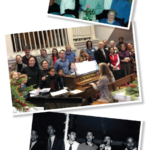To conclude, Dr. Solow thanked the audience and said, “We love to and need to hear from you. What GAC focuses on each year depends on what our research group and rheumatology practitioners tell us we need to be focusing on. The more we amplify our voice, the more effective we’ll be in passing legislation that makes it easier to take care of patients.”
Why & How to Advocate
Dr. Worthing opened his talk with a big picture overview of the U.S. healthcare system. “About 25% of the U.S. budget goes toward health, so there’s a huge number of lobbyists from various stakeholders—e.g., pharmaceutical companies, physicians, etc.—involved,” he explained. “Rheumatologists only account for about 0.6% of all doctors, but we have a huge agenda to push through. So we need to leverage the ACR’s voice.”

Dr. Worthing
The ACR exercises its voice in several ways: coalitions, op-eds, press reports, Capitol Hill fly-ins, RheumPAC (see below), involvement in the American Medical Association (AMA) and grassroots emails from ACR members. Regarding the latter, Dr. Worthing engaged the audience in a quick and easy advocacy exercise that was as simple as texting the word “MEDICARE” to 345-345. In response, participants received a texted link that allowed them each to automatically send a message to the district representative and two senators who represent them in Congress.
For other ways to advocate, Dr. Worthing shared an “advocacy bucket list”:
- Visit the Legislative Action Center on the ACR website to send more messages to your lawmakers;
- Call, write letters or use social media to engage your local and state congresspeople;
- Get involved with your state rheumatology society;
- Make a state law;
- Join the AMA;
- Get your patients and friends involved;
- Join one of the ACR’s twice-yearly visits to Capitol Hill for Advocacy 101 and Advocates for Arthritis; and
- Consider investing in RheumPAC or the Rheumatology Research Foundation.
RheumPAC is the ACR’s nonpartisan political action committee (PAC), which works to elect and support pro-rheumatology candidates. It was created in 2007 with the mission of educating, electing and supporting federal lawmakers who understand and can positively address the issues that impact rheumatology care providers and their patients. The Rheumatology Research Foundation is the largest private funding source for rheumatology research and training in the U.S.
Although we wish it weren’t true, caring for our patients involves more than just seeing them in clinic and writing prescriptions. The extra work can leave us feeling powerless, understaffed and over-scrutinized. Taking action toward better policies and practices can help fight those feelings, and the ACR is here to help.

